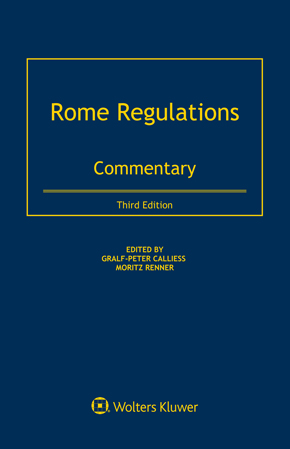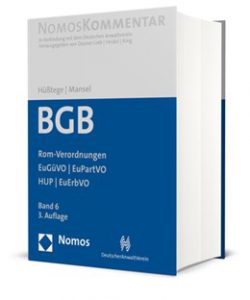An action brought between parties to a contract in a scenario where the consent to at least some of the contractual terms was allegedly expressed by the plaintiff only on account of the dominant position of the defendant is to be considered as falling within the concept of ‘matters relating to contract’ [Article 7(1) of the Brussels I bis Regulation] or within the concept of ‘matters relating to delict or quasi-delict’ [Article 7(2) of the Regulation]?
In his Opinion delivered last Thursday, 10 September 2020, Advocate General Saugmandsgaard Øe addresses that question for the purposes of the reference for a preliminary ruling in the case C-59/19, Wikingerhof.
Legal and factual context
A company established under German law and operating a hotel in this Member State, Wikingerhof GmbH & Co KG, signs a contract with Booking.com BV, a company which its registered office in the Netherlands that operates a hotel reservation platform. On the basis of the contract, the hotel is to be listed on that platform. The general terms and conditions that are supposed to apply to the contract contain a clause according to which the place of jurisdiction for all disputes arising from that contract, with the exception of payment and invoice disputes, is Amsterdam.
Wikingerhof brings and action for cessation against Booking.com before German courts and argues that it expressed its consent to at least to some of the contractual terms only on account of the dominant position of the defendant. The plaintiff views some of the practices of the defendant in connection with hotel reservation intermediation as an infringement of competition law. It seeks an order restraining the defendant from carrying on with these practices.
The defendant objects, inter alia, to the jurisdiction of the courts seised in the matter. The first instance court agrees and rules the action inadmissible. It considers that the parties have concluded an agreement conferring jurisdiction and as a consequence the action should have been brought before the courts in Amsterdam.
The second instance court dealing with an appeal brought by the plaintiff also views the action as inadmissible, yet on the different grounds.
It considers that the German courts do not have jurisdiction under Articles 7(1) and (2) of the Brussels I bis Regulation. For the second instance court, the action seeks to change the content of the contract and to alter the defendant’s practices. The action in question should therefore receive a contractual qualification, yet ‘the place of performance’ within the meaning of Article 7(1) of the Regulation is not situated in Germany. For that court, the question of whether an effective agreement conferring jurisdiction was entered into is therefore irrelevant. It seems that this court considers that under no circumstances the German courts hold jurisdiction over the action brought by the plaintiff.
Ultimately, the case comes before the Federal Court of Justice (Bundesgerichtshof). The latter considers that the parties have not entered into an effective agreement conferring jurisdiction. The requirements relating to the form of such agreement, set in Article 25(1)(a) and (2) of the Brussels I bis Regulation have not been met. However, the Federal Court of Justice refers a preliminary question relating to the characterization of the action brought by the plaintiff:
‘Is Article 7(2) of [the Brussels I bis Regulation] to be interpreted as meaning that jurisdiction for matters relating to tort or delict exists in respect of an action seeking an injunction against specific practices if it is possible that the conduct complained of is covered by contractual provisions, but the applicant asserts that those provisions are based on an abuse of a dominant position on the part of the defendant?’
Opinion of Advocate General
According to the Opinion of AG Saugmandsgaard Øe, a civil liability action based on a breach of competition law falls within the scope of ‘matters relating to delict or quasi-delict’ within the meaning of Article 7(2) of the Brussels I bis Regulation, also when the plaintiff and the defendant are parties to a contract and the alleged anticompetitive conduct materializes itself in their contractual relationship.
The analysis that precedes this conclusion begins with an observation that the action brought by the plaintiff in the main proceedings is ‘based’ on the violation of the rules of German law prohibiting, like Article 102 TFEU, abuse of dominant position (point 19).
Next, the Opinion acknowledges that while it results from the case-law that the actions on anticompetitive conducts – including those constituting an infringement under Article 102 TFEU – fall within the scope of Article 7(2) of the Regulation, the particularity of the proceedings at hand stem from the fact that the alleged anticompetitive conduct occurred within the context of a contractual relationship (point 26).
After that, a reminder of case-law on Article 7(1) and (2) of the Regulation leads the AG to the judgments in Kalfelis and Brogsitter. Concerning the latter, he considers that two interpretations of the judgment are a priori possible (point 68). First, which the AG describes as ‘maximalist’, would imply that an action based on delict falls under the concept of ‘matter relating to contract’ within the meaning of Article 7(1) if the action concerns a harmful event that could (also) constitute a breach of a contractual obligation. In other terms, a national court would have to verify whether an action could also have been brought on the basis of breach of a contractual obligation. For the AG, that interpretation would imply that the contractual characterisation of a claim prevails over its characterisation as a matter relating to delict (point 69).
The AG rejects such ‘maximalist’ interpretation. First, an analysis allowing to establish a potential breach of a contractual obligation would be too burdensome at the stage where the jurisdiction is determined and could require consideration of the substance of the case (point 76). Next, under the Regulation, no hierarchy exists between the rules on jurisdiction provided for in Articles 7(1) and (2) (point 79). In this context, the AG resorts to an argument based on the idea that the solution adopted in relation to the rules on jurisdiction would have to be followed in relation to the conflict-of-laws rules of the Rome I and Rome II Regulations: the contractual characterisation would have to prevail also under these Regulations (points 81 and 82).
As a consequence, the AG pronounces himself in favour of a second interpretation of the judgment in Brogsitter that he describes as a ‘minimalist’ one. Here, an action would fall within the scope of Article 7(1) of the Regulation where ‘the interpretation of the contract […] is indispensable to establish the lawful or, on the contrary, unlawful nature of the conduct complained of against the [defendant] by the [plaintiff]’ (point 70).
At points 90 et seq., the AG describes the method of characterisation that results from his ‘minimalist’ interpretation of the judgment in Brogsitter. He discusses the cases where a plaintiff invokes rules of substantive law in his submission of action and where he or she does not – according to the AG, in the latter scenario, his method does not change fundamentally. He argues that on the basis of other elements of the submission of action, a judge has to identify the ‘obligation’ relied on by the plaintiff (point 96).
At points 100 and 101, the AG furtherly explains and recaps the method: where the plaintiff invokes, in his submission of an action, rules of substantive law imposing a duty on everyone and it does not appear ‘indispensable’ to establish the content of a contract in order to assess the lawful or unlawful nature of the conduct alleged against the defendant, the action is based on a non-contractual obligation (the Opinion uses the term ‘obligation délictuelle’) and therefore falls within the scope of ‘matters relating to delict or quasi-delict’ within the meaning of Article 7(2) of the Brussels I bis Regulation. However, where, irrespective of the rules of law relied on, a judge can assess the legality of the conduct only by reference to a contract, the action is essentially based on a ‘contractual obligation’ and therefore falls within the scope of ‘matters relating to a contract’ within the meaning of Article 7(1) of the Regulation.
It is yet to be seen to what extent the importance of the rules of substantive law invoked by a plaintiff will play a role in the future judgment of the Court. In any case, on the basis of these findings, the AG concludes that the contractual characterisation of the action brought by the plaintiff before the German courts should be rejected.
The Opinion can be found here (no English version yet).
On a side note…
The lecture of the Opinion presented above raises a point that could on its own inspire an interesting discussion. It seems that, for the AG, what is true under the Brussels regime, should also stand as true under the Rome I and II Regulation. In fact, an argument relating to the consistency between the solutions adopted with regards to the Brussels I bis and Rome I/II Regulations is invoked in the Opinion in order to reject the interpretation which, for the AG, would imply the priority of contractual characterisation over non-contractual characterisation (see points 81 and 82).
Against this background, in his Opinion in Bosworth and Hurley (points 91 to 103), AG Saugmandsgaard Øe seemed to consider that the contractual characterisation of an action should be favoured over the non-contractual characterisation where an individual contract of employment is at stake. That consideration was made in relation to the rules of jurisdiction and more precisely – to Article 18 of Lugano II Convention. As it was not necessary to answer the preliminary question that inspired the aforementioned considerations of the AG, the Court did not have an opportunity to clarify in its Judgment whether such preference of contractual characterisation does indeed occur.
Yet, if that is the case and the argument on the consistency of solutions adopted under the Regulations is valid, should the Rome I and II Regulations be read as implying a priority (or even exclusivity) of a contractual characterisation also for the conflict-of-laws purposes in a situation where a harmful conduct concerns employee – employer scenario?


 Adding to the list of recent German publications on Private International Law, the 3rd edition of
Adding to the list of recent German publications on Private International Law, the 3rd edition of  of the Rome I Regulation on the law applicable to contractual obligations.
of the Rome I Regulation on the law applicable to contractual obligations.